TODAY’S READING FROM THE OLD TESTAMENT – EZEKIEL 31:1-32:32
Chapter 31 begins with the fifth oracle concerning Egypt. It was given approximately 2 months before the destruction of Jerusalem. The Egyptian powers that Israel called to save them would topple like a mighty cedar tree.
There is some debate among scholars about the word translated ‘Assyria’ in verse 3, which also could be interpreted as ‘Asshur’, the name of ‘a great tree’. “Consider, Asshur, the great tree, once a cedar in Lebanon”. Most translations read: “Consider Assyria, once a cedar in Lebanon.” Assyria, also fell to Babylon, so the prophecy still holds- Egypt, like Assyria, will fall.
The prophecy is addressed to Pharaoh of Egypt. The nations that had been brought under the great shadow of the Egyptian Empire, and were dependent upon it, will be affected by its fall (as were those nations of the Assyrian Empire).
The fall of the mighty is a reminder of the shortness and vulnerability of human life. Egypt was Israel’s false hope. What are you putting your hope in? Are you putting your hope in what will eventually be toppled? Is your source of trust, accommodating perversion and pride? Are you trusting this corrupt world system? Or are you placing your trust in the unshakeable foundation of God’s Word?
Don’t forget what Jesus said:
Matthew 24:35 35 Heaven and earth shall pass away, but my words shall not pass away.
The prophetic lament over Pharaoh, king of Egypt, is not pretty. He and the people of Egypt would meet a violent end in a foreign land.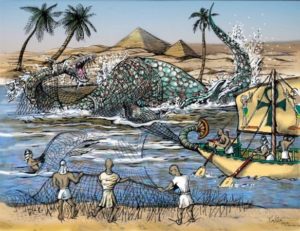
Ezekiel 32:2-3 2 “Son of man, take up a lamentation over Pharaoh king of Egypt and say to him, ‘You compared yourself to a young lion of the nations, Yet you are like the monster in the seas; And you burst forth in your rivers and muddied the waters with your feet and fouled their rivers.'” 3 Thus says the Lord GOD, “Now I will spread My net over you with a company of many peoples, and they shall lift you up in My net.
Ezekiel 32:15 15 When I shall make the land of Egypt desolate, and the country shall be destitute of that whereof it was full, when I shall smite all them that dwell therein, then shall they know that I am the LORD.
This Psalm closes with the final prophecy against Egypt dated April 1, 585 B.C. It reviews the previous falls of other political powers and concludes that Egypt will join them in the pit.
Ezekiel 32:17-18 17 In the twelfth year, on the fifteenth of the month, the word of the LORD came to me saying, 18 “Son of man, wail for the hordes of Egypt and bring it down, her and the daughters of the powerful nations, to the nether world, with those who go down to the pit.
The Egyptian pharaohs had a preoccupation with the afterlife. Many of the pyramids were built to ensure their comforts in the next life. The Hebrews also believed in the afterlife. Ezekiel assumes that the evil nations have already been sent to the pit. These words are more poetic, than doctrinally enlightening.
Assyria had already been overthrown by the Babylonians. Elam had been destroyed by Ashurbanipal with its capital city of Susa in 650 B.C. Babylon had taken over, and after the fall of Babylon, Susa would become the winter capital city for the King of Persia. Meshech and Tubal were older nations in Asia Minor who were also in the pit. In Chapters 38 and 39 they are seen as allies of Gog and part of its confederacy which will be judged by God for fighting against Israel.
TODAY’S READING IN THE NEW TESTAMENT- HEBREWS 12:14-29
The writer of Hebrews uses the image of a foot race to describe the Christian life. We encountered this in the writings of Paul.
1 Corinthians 9:24 24 Do you not know that those who run in a race all run, but only one receives the prize? Run in such a way that you may win.
2 Timothy 4:7 7 I have fought the good fight, I have finished the course, I have kept the faith.
A major theme of the Letter to the Hebrews is to press on to finish the race. The race requires patience and endurance. You will face opposition, but don’t give up. Holiness is what we are to pursue, and discipline is what we must endure. God uses hardship to perfect us, to shape us, and strengthen us.
God’s fatherly chastisement is a means of our sanctification (Hebrews 12:4-11). So also are our personal relationships.
Hebrews 12:14 14 Pursue peace with all men, and the sanctification without which no one will see the Lord.
What an important relationship goal– pursue peace with everyone. The writer exhorts Christians to look out for one another, so that no one falls short of experiencing the grace of God in salvation. A person who is truly saved will have the desire to pursue holiness, even though he or she may fail. But even on those occasions when we sin, we do not jettison the gospel. To reject the gospel is to fail the grace of God. We dare not fail to lay hold of the grace of God and all that it can do to sanctify us as well as justify us. Lack of spiritual diligence, bitterness, and sexual immorality can obstruct the process of sanctification. The writer gives the example of Esau, who demonstrated his lack of affection for the real eternal blessings of God by despising his birthright.
The writer then contrasts the covenant made at Mt. Sinai, (the giving of the Law), with the New Covenant, (the gift of salvation through the finished work of Christ), which is symbolized by Mt. Zion. Sinai ministered condemnation because of our sin. Zion ministers God’s grace, because of Jesus’ perfect sacrifice for sin. The blood of Abel cries out for vengeance. The blood of Jesus cries out ‘forgiveness’.
Here is the major theme of Hebrews- God is pleading with these Hebrews to believe on the finished work of Christ and not be drawn back to the religion of self-justifying works and a religion of types and shadows. They should not reject the substantial reality of salvation found in the person of Christ, for a religion of shadows and types that have no power to deliver salvation.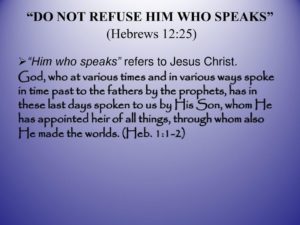
Hebrews 12:25-27 25 See to it that you do not refuse Him who is speaking. For if those did not escape when they refused him who warned them on earth, much less will we escape who turn away from Him who warns from heaven.
Hebrews 12:28-29 28 Therefore, since we receive a kingdom which cannot be shaken, let us show gratitude, by which we may offer to God an acceptable service with reverence and awe; 29 for our God is a consuming fire.
TODAY’S READING FROM THE BOOK OF PSALMS – PSALMS 113:1-114:8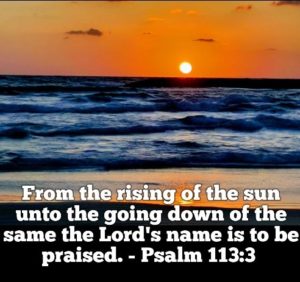
All day long the Name of the Lord is to be praised.
This Psalm rejoices in God’s supremacy and His grace.
Psalm 113:2-3 2 Blessed be the name of the LORD from this time forth and forever. 3 From the rising of the sun to its setting the name of the LORD is to be praised.
He is incomparable in His person and His work. His supremacy is illustrated by the fact that He must humble himself to look upon an angel.
Psalm 113:6 6 Who humbles Himself to behold the things that are in heaven and in the earth?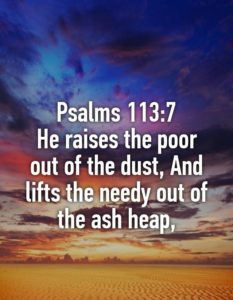
Grace- He does for us what we could not do for ourselves. This is the story of Sarai and Hannah. It is also the story of every believer, for we were barren of any possibility of saving ourselves.
Psalm 113:9 9 He makes the barren woman abide in the house as a joyful mother of children. Praise the LORD!
The Lord wonderfully identified with His people in the exodus from Egypt. He called His migrant people, who wandered through the wilderness, His sanctuary and His dominion. God is with us.
Judah and Israel refer to one nation, though they are still divided at this time.
Warren Wiersbe divides Psalm 114 into three parts. The themes of the verses are:
1- God is for us- (v. 1)
2- God is with us (v. 2a) God provided a dwelling place and chose to live among us.
- God is over us. He is Sovereign and He will bring His promises to pass. (v.2-3)
Psalm 114:2 2 Judah became His sanctuary, Israel, His dominion.
- God is before us. (v.3-8). Psalm 114:3 3 The sea looked and fled; The Jordan River turned back.
The impossible became possible. (v. 3-8) God has gone before us, and He has opened a way for guilty sinners to be reconciled to Himself. Obstacles such as the Red Sea and the Jordan River have been removed so that His people can be saved.
TODAY’S READING FROM THE BOOK OF PROVERBS – PROVERBS 27:18-20
Proverbs 27:18-20 18 He who tends the fig tree will eat its fruit, and he who cares for his master will be honored. 19 As in water face reflects face, so the heart of man reflects man. 20 Sheol and Abaddon are never satisfied, nor are the eyes of man ever satisfied.
Verse 18 reminds us that diligent care will be rewarded. Verse 19 reminds us that the true nature of man cannot be seen at face value. God knows a man by his heart’s inclinations, motives, and desires. Verse 20 speaks of the nature of fallen man as never being satisfied.
PRAY FOR THE NATIONS
(from “Operation World Prayer Guide”) TAJIKISTAN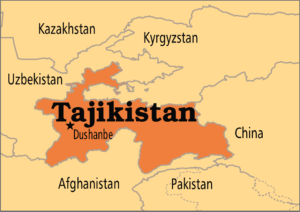
Tajikistan
Republic of Tajikistan
Asia
Geography
Area: 143,100 sq km
Bordering on Afghanistan, China, Uzbekistan and Kyrgyzstan. The Pamir and Tien-Shan Mountains are 93% of the surface area.
Population: 7,074,845 Annual Growth: 1.60%
Capital: Dushanbe
Urbanites: 26.5%
HDI Rank: 127 of 182 (UN Human Development Reports 2009)
Peoples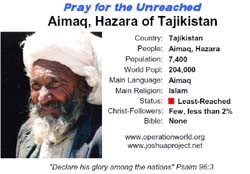
Peoples: 46 (59% unreached) All peoples
Unreached Peoples Prayer Card
Official language: Tajik Languages: 33 All languages
Religion
Largest Religion: Muslim
|
Religion |
|
Pop % |
Ann Gr |
|
73,578 |
1.04 |
-2.2 |
|
|
6,952 |
0.1 |
6.9 |
|
|
Muslim |
6,645,402 |
93.93 |
|
Answer to Prayer
The birth of a Tajik Church, although a slow and painstaking process, is now reality. The Church among Tajiks is small, only a thousand, but growing.
Challenge for Prayer
Christian media ministries.
- a) The whole Bible in Tajik exists; work on a much-needed simplified translation is underway with the Gospels already available. GRN has materials in seven languages. Importing Bibles and Christian literature is extremely difficult; pray for the effective entry and distribution of the good news in printed form.
- b) A number of Christian videos and DVDs, including the JESUS film, are available in most languages spoken in Tajikistan. Such material is in high demand in several languages.
- c) Christian radio. TWR broadcasts in Tajik for 90 minutes per week. Various agencies broadcast in Uzbek 2.5 hours per week. There are many programs in Farsi that can be understood and in many minority languages; pray for more to listen to these life-changing words.
- d) Satellite TV. Many Farsi and Russian religious programs are available by satellite and watched by many in Tajikistan.
- e) A few websites share the gospel in Tajik, such as www.isoimaseh.com and www.dardidil.com .
PRAYER: Lord, Your Name is to be praised ‘from the rising of the sun’! We affirm the truth that because of the reconciling work of Your Son, You are for us, with us, over us and go before us. Our heart’s desire is to know You more and run the race that has been set before us. We thank You for all that You use to make us more like Jesus. We ask that we would have the grace to pursue holiness and peace with others. In Jesus’ Name. Amen.
Pastor David
